I love to read. I find it helpful to summarize my thoughts on each book and I offer those thoughts in the hope that you will be encouraged to either read or pass over the given title.
It’s been over six weeks since I last offered up a “Recent Reads” post, but my reading hasn’t slowed down. In order that this post doesn’t become unnecessarily long I’ve selected seven of the books I completed that might be of most interest to ordinary pastors.
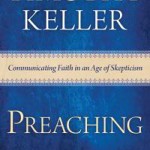 Preaching: Communicating Faith in an Age of Skepticism by Tim Keller. The Manhattan Man’s treatise on preaching has been in the works for a long time. Thankfully it has arrived. Those familiar with his preaching ministry and homiletical convictions won’t find anything new in this work. But don’t mistake that as being a bad thing. Preaching is saturated with instruction on concerns you’d expect from Keller: preaching contextually, understanding cultural narratives, and making the gospel of Christ central in every sermon. The book shines brightest in the last two chapters, “Preaching Christ to the Heart,” and “Preaching and the Spirit.” Two chapters that ought to be required reading for every preaching student or preaching pastor.
Preaching: Communicating Faith in an Age of Skepticism by Tim Keller. The Manhattan Man’s treatise on preaching has been in the works for a long time. Thankfully it has arrived. Those familiar with his preaching ministry and homiletical convictions won’t find anything new in this work. But don’t mistake that as being a bad thing. Preaching is saturated with instruction on concerns you’d expect from Keller: preaching contextually, understanding cultural narratives, and making the gospel of Christ central in every sermon. The book shines brightest in the last two chapters, “Preaching Christ to the Heart,” and “Preaching and the Spirit.” Two chapters that ought to be required reading for every preaching student or preaching pastor.
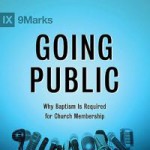 Going Public: Why Baptism is Required for Church Membership by Bobby Jamieson. The focus of 9Marks’ latest book is pointed—should believer’s baptism be required for all church members? Jamieson gives a thoughtful emphatic, “Yes,” as you’d expect from reading the subtitle. His primary interlocutors are John Bunyan and John Piper, for they represent 17th century and 21st century convictions of “open membership” (the view that paedobaptists can be accepted as members in a credobaptist church). I’ve heard one prominent Baptist say the book paves new ground in our understanding of the sacraments and church membership, but I couldn’t discern what this new ground is supposed to be. I can see some parts of the argument being new for Baptists, but many aren’t new to—what I see as—a more historically Reformed understanding on specific matters. Case in point: the chapter on baptism as “The Initiating Oath-Sign of the New Covenant” is as rich a treatment on the covenantal realities of baptism I’ve seen put forth by a Baptist (and probably a new way of thinking about baptism for many Baptists). Yet, Reformed treatments on the subject have been making similar arguments for centuries. Nonetheless, this is a very valuable book and necessary reading for anyone interested in the intra-Baptist debate on open membership and closed membership.
Going Public: Why Baptism is Required for Church Membership by Bobby Jamieson. The focus of 9Marks’ latest book is pointed—should believer’s baptism be required for all church members? Jamieson gives a thoughtful emphatic, “Yes,” as you’d expect from reading the subtitle. His primary interlocutors are John Bunyan and John Piper, for they represent 17th century and 21st century convictions of “open membership” (the view that paedobaptists can be accepted as members in a credobaptist church). I’ve heard one prominent Baptist say the book paves new ground in our understanding of the sacraments and church membership, but I couldn’t discern what this new ground is supposed to be. I can see some parts of the argument being new for Baptists, but many aren’t new to—what I see as—a more historically Reformed understanding on specific matters. Case in point: the chapter on baptism as “The Initiating Oath-Sign of the New Covenant” is as rich a treatment on the covenantal realities of baptism I’ve seen put forth by a Baptist (and probably a new way of thinking about baptism for many Baptists). Yet, Reformed treatments on the subject have been making similar arguments for centuries. Nonetheless, this is a very valuable book and necessary reading for anyone interested in the intra-Baptist debate on open membership and closed membership.
 Confessions by Augustine. Simply magnificent. For years this has sat on my shelf begging to be read, yet it took a PhD seminar in Patristic Spirituality to get me to actually read Augustine’s classic. I’m not sure if I should say much about Confessions lest I break out into a string of redundant superlatives. So I will only say, “Read this book!”
Confessions by Augustine. Simply magnificent. For years this has sat on my shelf begging to be read, yet it took a PhD seminar in Patristic Spirituality to get me to actually read Augustine’s classic. I’m not sure if I should say much about Confessions lest I break out into a string of redundant superlatives. So I will only say, “Read this book!”
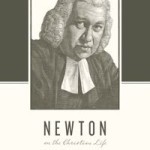 Newton on the Christian Life: To Live is Christ by Tony Reinke. The praise for Reinke’s book on Newton was so eye-grabbing that I couldn’t help but grab the book myself. “Here is mastery!” cries Packer. “For some readers, this book may just become the most important book, outside the Bible, they will ever read,” declares Ortlund. I think the hyperbolic endorsements created unrealistic expectations, for I confess to having felt a bit disappointed when I finished . . . even though the book is solid. Maybe it’s because I found the book too long, a bit redundant, overly italicized, or maybe it’s because I can be a stodgy reader. Who knows. But you must not mistake my unmet expectations as being reason not to read the book. In fact, I recommend the book to anyone. Read this dissertation with slow meditation. Read it to observe a man—Newton—stare hard and long at the glory of the Savior. You just might find Newton giving you fresh insights into Christ and the human heart. If he does that for you, Newton on the Christian Life will be worth every penny.
Newton on the Christian Life: To Live is Christ by Tony Reinke. The praise for Reinke’s book on Newton was so eye-grabbing that I couldn’t help but grab the book myself. “Here is mastery!” cries Packer. “For some readers, this book may just become the most important book, outside the Bible, they will ever read,” declares Ortlund. I think the hyperbolic endorsements created unrealistic expectations, for I confess to having felt a bit disappointed when I finished . . . even though the book is solid. Maybe it’s because I found the book too long, a bit redundant, overly italicized, or maybe it’s because I can be a stodgy reader. Who knows. But you must not mistake my unmet expectations as being reason not to read the book. In fact, I recommend the book to anyone. Read this dissertation with slow meditation. Read it to observe a man—Newton—stare hard and long at the glory of the Savior. You just might find Newton giving you fresh insights into Christ and the human heart. If he does that for you, Newton on the Christian Life will be worth every penny.
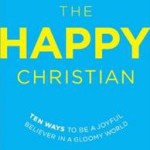 The Happy Christian by David Murray. I’m utterly delighted Murray has given us this book. The title and cover may seem a bit sappy (Murray admits he didn’t like the title at first), but The Happy Christian is a book worth everyone’s attention. For Murray is right, Christians should be the happiest people in the world! The man from Puritan Reformed Seminary weaves together biblical insight, scientific research, and personal anecdotes in convincing fashion. Each chapter offers a mathematical spiritual formula for happiness and many of them are worth memorizing. Formulas such as, “Facts > Feelings = Positive” (chapter 1), “Done > Do = Positive” (chapter 3), or “Future > Past = Positive” (chapter 5) are handy guides for everyday happiness in Christ. Several of the chapters are longer than necessary, but Murray fills them with plenty of short sections and never overtaxes one’s attention. I can see this being a useful discipling resource for churches and small groups.
The Happy Christian by David Murray. I’m utterly delighted Murray has given us this book. The title and cover may seem a bit sappy (Murray admits he didn’t like the title at first), but The Happy Christian is a book worth everyone’s attention. For Murray is right, Christians should be the happiest people in the world! The man from Puritan Reformed Seminary weaves together biblical insight, scientific research, and personal anecdotes in convincing fashion. Each chapter offers a mathematical spiritual formula for happiness and many of them are worth memorizing. Formulas such as, “Facts > Feelings = Positive” (chapter 1), “Done > Do = Positive” (chapter 3), or “Future > Past = Positive” (chapter 5) are handy guides for everyday happiness in Christ. Several of the chapters are longer than necessary, but Murray fills them with plenty of short sections and never overtaxes one’s attention. I can see this being a useful discipling resource for churches and small groups.
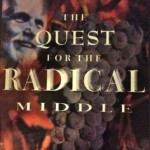 The Quest for the Radical Middle: A History of the Vineyard by Bill Jackson. One reason for my recent blog hiatus was a research paper I needed to complete on the spirituality of Vineyard music. One of the many invaluable resources I came across in research was Bill Jackson’s excellent history. This is the definitive account of a movement that swept through and swept up evangelicalism in the late 20th-century. Jackson writes as sympathetically (he’s a Vineyard pastor), but not uncritically. As the book was published only two years after the death of John Wimber, the Vineyard’s leader and shaper, it’s essentially a history of “The Wimber Years.” And what fascinating years they were! I only wish all PhD research was so intriguing from cover to cover.
The Quest for the Radical Middle: A History of the Vineyard by Bill Jackson. One reason for my recent blog hiatus was a research paper I needed to complete on the spirituality of Vineyard music. One of the many invaluable resources I came across in research was Bill Jackson’s excellent history. This is the definitive account of a movement that swept through and swept up evangelicalism in the late 20th-century. Jackson writes as sympathetically (he’s a Vineyard pastor), but not uncritically. As the book was published only two years after the death of John Wimber, the Vineyard’s leader and shaper, it’s essentially a history of “The Wimber Years.” And what fascinating years they were! I only wish all PhD research was so intriguing from cover to cover.
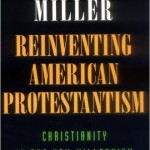 Reinventing American Protestantism: Christianity in the New Millennium by Donald Miller. In 1997 sociologist Donald Miller published his study of what he termed “new paradigm churches,” the most influential of which are Calvary Chapter and the Vineyard. Miller argues, as Larry Eskridge ably states, “New Paradigm churches achieved a unique balance, incorporating aspects of the therapeutic, individualistic, and antiestablishment values of the counterculre [of the late 1960s to early 1970s] while rejecting its inherent narcissistic tendencies. He goes on to demonstrate that while Calvary Chapel and the Vineyard were fundamentalist in many areas, their organizational pragmatism broke the mold of traditionally evangelical denominations and thus ushered in a new age of “doing church.” I leaned heavily on his study of music in the New Paradigm churches, where he concludes, “Worship may be viewed as a form of sacred lovemaking.” And that, my friends, is a “memorably correct” conclusion.
Reinventing American Protestantism: Christianity in the New Millennium by Donald Miller. In 1997 sociologist Donald Miller published his study of what he termed “new paradigm churches,” the most influential of which are Calvary Chapter and the Vineyard. Miller argues, as Larry Eskridge ably states, “New Paradigm churches achieved a unique balance, incorporating aspects of the therapeutic, individualistic, and antiestablishment values of the counterculre [of the late 1960s to early 1970s] while rejecting its inherent narcissistic tendencies. He goes on to demonstrate that while Calvary Chapel and the Vineyard were fundamentalist in many areas, their organizational pragmatism broke the mold of traditionally evangelical denominations and thus ushered in a new age of “doing church.” I leaned heavily on his study of music in the New Paradigm churches, where he concludes, “Worship may be viewed as a form of sacred lovemaking.” And that, my friends, is a “memorably correct” conclusion.
Click here to find other entries in the Recent Reads series.
